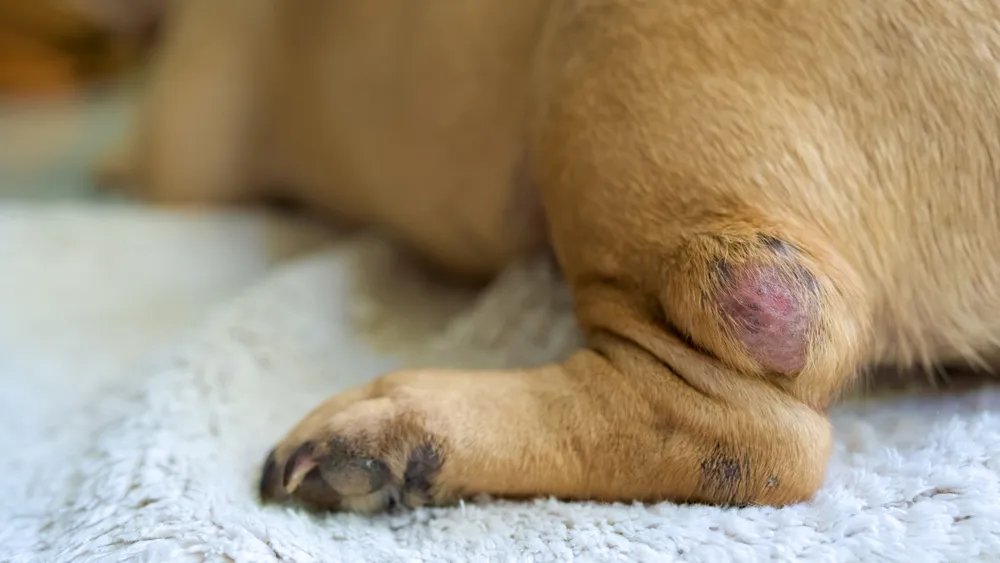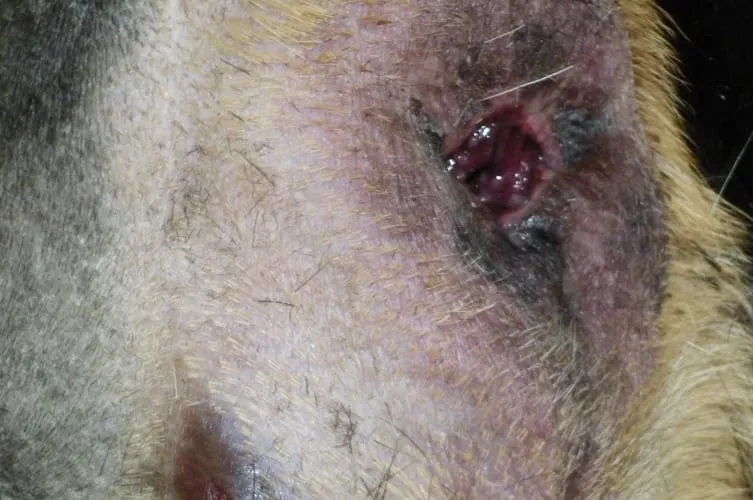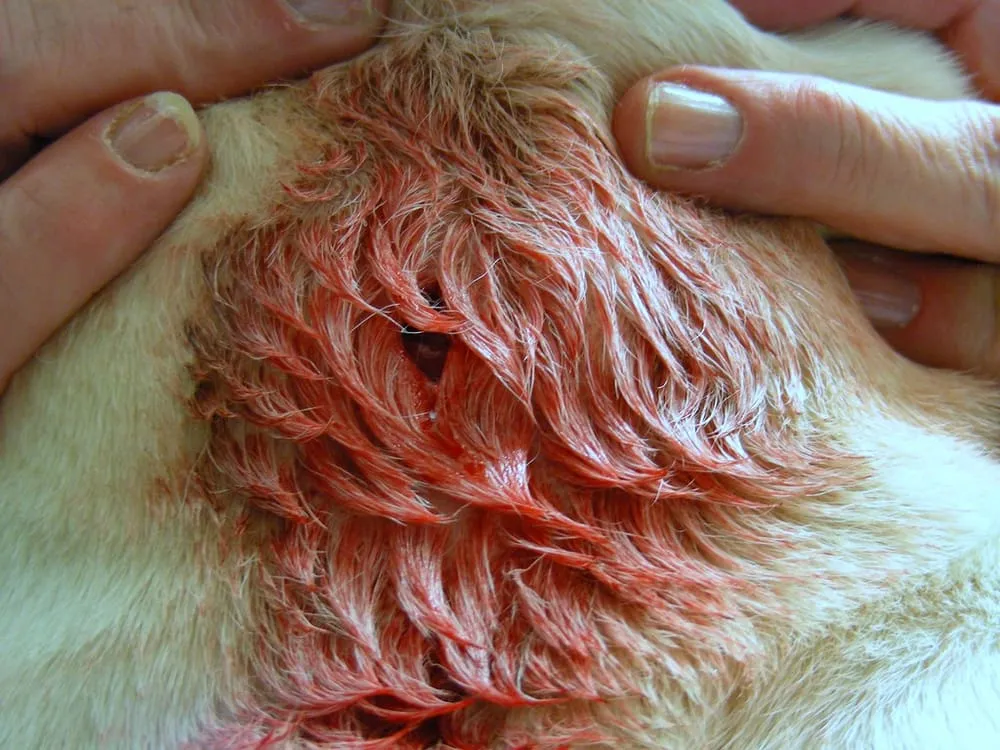Skin ulcers in dogs can be a painful and distressing condition for both the dog and its owner. Skin ulcers are open sores that can occur anywhere on a dog's body and can be caused by a variety of factors. These factors can include infections, allergies, parasites, trauma, and even cancer.

Skin ulcers in dogs can present in different ways depending on the underlying cause. Some ulcers may appear as small, circular lesions that are red and inflamed, while others may be larger and deeper, with a foul odor and discharge. It is important to seek veterinary care if a dog develops a skin ulcer, as early diagnosis and treatment can help prevent the ulcer from becoming more severe and causing further complications.
Owners can help prevent skin ulcers in their dogs by keeping them clean, providing a healthy diet, and protecting them from injury. Regular grooming and inspecting a dog's skin can also help identify any potential issues early on. With proper care and attention, skin ulcers in dogs can be managed effectively, and the dog can go on to live a happy and healthy life.
Understanding Skin Ulcers in Dogs
Skin ulcers are a common condition in dogs that can be caused by a variety of factors. Understanding the causes and types of skin ulcers can help pet owners recognize and treat them effectively.
Causes and Risk Factors
Skin ulcers in dogs can be caused by a range of factors, including injury, infection, autoimmune disorders, parasites, age, genetics, and environmental factors. Lesions or wounds on the skin can lead to the development of ulcers, especially if they become infected with bacteria or fungi.
Certain breeds of dogs may be more prone to developing skin ulcers, such as those with short hair or wrinkled skin. Dogs with weakened immune systems or underlying health conditions may also be at a higher risk.
Types of Skin Ulcers
There are several types of skin ulcers that can affect dogs, each with their own unique characteristics and causes. Some common types of skin ulcers in dogs include:
- Pressure ulcers: These are caused by prolonged pressure on a specific area of the skin, such as from lying on a hard surface for an extended period of time.
- Traumatic ulcers: These are caused by physical injury to the skin, such as from biting or scratching.
- Infectious ulcers: These are caused by bacterial or fungal infections that penetrate the skin.
- Autoimmune ulcers: These are caused by an overactive immune system that attacks healthy skin cells.
- Parasitic ulcers: These are caused by infestations of external parasites, such as fleas or ticks.
In conclusion, skin ulcers in dogs can be caused by a variety of factors, and it is important for pet owners to be aware of the signs and symptoms. By understanding the causes and types of skin ulcers, pet owners can take steps to prevent and treat this common condition.
Symptoms and Identification

Common Symptoms
Skin ulcers in dogs can manifest in various ways, and the symptoms may vary depending on the underlying cause. Some common symptoms of skin ulcers in dogs include the presence of a lesion or sore that is slow to heal, redness, pain, itching, rashes, and hair loss. These symptoms may be localized or widespread, and they can be accompanied by other signs of illness, such as fever, lethargy, and loss of appetite.
Diagnostic Procedures
To diagnose skin ulcers in dogs, veterinarians typically perform a thorough physical examination, which may include taking a detailed medical history. Diagnostic procedures such as a skin biopsy, x-rays, ultrasounds, and urinalysis may also be necessary to determine the underlying cause of the skin ulcer. A skin biopsy involves taking a small sample of tissue from the affected area for laboratory analysis. X-rays and ultrasounds can help detect underlying bone or organ damage, while urinalysis can help identify any underlying metabolic disorders.
Overall, early detection and treatment are crucial in managing skin ulcers in dogs. Pet owners should monitor their dogs for any signs of skin ulcers and seek veterinary care promptly if any symptoms are observed. With proper diagnosis and treatment, most dogs can recover from skin ulcers and live a healthy, happy life.
Treatment Options
Skin ulcers in dogs can be treated using various methods, depending on the severity of the condition. Treatment options include medications and topical treatments, surgical interventions, and alternative therapies.
Medications and Topical Treatments
The first line of treatment for skin ulcers in dogs involves medications and topical treatments. Antibiotics may be prescribed to treat bacterial infections that may be present in the wound. Hydroactive wound dressings may also be used to help promote healing and prevent further infection.
Topical treatments such as ointments and creams may also be prescribed to help reduce inflammation and promote healing. These treatments may contain ingredients such as corticosteroids, silver, and honey.
Surgical Interventions
In some cases, surgical intervention may be necessary to treat skin ulcers in dogs. This may involve debridement of the wound, which is the removal of dead tissue to promote healing. Skin grafts may also be used to cover the wound and promote healing.
It is important to note that surgical interventions are typically reserved for more severe cases of skin ulcers and should only be performed by a licensed veterinarian.
Alternative Therapies
Alternative therapies may also be used to treat skin ulcers in dogs. These therapies may include acupuncture, herbal remedies, and homeopathy. While there is limited scientific evidence to support the effectiveness of these therapies, some pet owners may find them helpful in conjunction with traditional treatments.
In conclusion, treatment options for skin ulcers in dogs include medications and topical treatments, surgical interventions, and alternative therapies. It is important to consult with a licensed veterinarian to determine the best course of treatment for your pet.

Management and Care
Wound Care
Proper wound care is crucial for the management of skin ulcers in dogs. The wound should be kept clean and dry to avoid infection. The veterinarian may prescribe topical or oral antibiotics to prevent or treat infection. In some cases, the wound may need to be debrided or surgically cleaned. Dressings may also be used to protect the wound and promote healing.
Diet and Nutrition
Nutrition plays an important role in the management of skin ulcers in dogs. A balanced and nutritious diet can help improve the dog's overall health and aid in the healing process. The veterinarian may recommend a specific diet or supplements to address any nutritional deficiencies or underlying conditions that may be contributing to the skin ulcers.
Follow-up and Monitoring
Regular follow-up appointments with the veterinarian are important to monitor the dog's progress and adjust the treatment plan as needed. The veterinarian may recommend additional tests or procedures to assess the extent of the skin ulcers and evaluate the dog's overall health. The prognosis for recovery depends on the severity of the skin ulcers and any underlying conditions that may be present.
Overall, the management and care of skin ulcers in dogs requires a collaborative effort between the dog owner and veterinarian. With proper wound care, nutrition, and follow-up, the dog can have a good prognosis for recovery. In some cases, hospitalization may be necessary for more intensive treatment and monitoring.
Complications and Prognosis
Possible Complications
Skin ulcers in dogs can lead to a variety of complications, depending on the severity of the ulcer and the underlying cause. Infections are a common complication that can occur when the ulcer is not properly treated or when the dog's immune system is weakened. This can lead to further tissue damage and delay the healing process.
In addition to infections, skin ulcers can cause depression and lethargy in dogs. The pain and discomfort associated with the ulcer can cause the dog to become less active and lose interest in activities they once enjoyed. Loss of appetite is also a common complication, as the dog may have difficulty eating due to the pain.
Outlook for Recovery
The prognosis for dogs with skin ulcers depends on the underlying cause and the severity of the ulcer. In some cases, the ulcer may heal on its own with proper wound care and management. However, in more severe cases, the ulcer may be life-threatening and require more aggressive treatment.
Adverse reactions to medication can also occur, so it is important to closely monitor the dog's progress and adjust treatment as necessary. With proper care and treatment, most dogs with skin ulcers can recover and return to their normal activities.
In conclusion, skin ulcers in dogs can lead to a variety of complications and the prognosis for recovery depends on the underlying cause and severity of the ulcer. It is important to closely monitor the dog's progress and seek veterinary care if necessary to ensure a successful outcome.

Prevention Strategies
Skin ulcers in dogs can be prevented with a few simple strategies. Here are some tips to keep your furry friend healthy and happy:
Environmental Adjustments
Environmental factors can play a role in the development of skin ulcers in dogs. It is important to keep your dog's living space clean and dry. Regular cleaning of bedding, toys, and other items can help prevent bacterial growth and infection. Additionally, providing your dog with a comfortable, well-ventilated space can help prevent hot spots and other skin irritations.
Regular Veterinary Check-ups
Regular check-ups with a veterinarian can help catch skin ulcers early on and prevent them from becoming more serious. During these check-ups, the veterinarian can examine your dog's skin and provide recommendations for preventing skin ulcers. They can also identify any underlying health issues that may increase your dog's risk for developing skin ulcers.
In addition to these strategies, it is important to be aware of any genetic predisposition your dog may have to skin ulcers. Certain breeds are more prone to developing skin ulcers, and knowing this information can help you take preventative measures early on. By following these strategies and working closely with a veterinarian, you can help keep your dog healthy and free from skin ulcers.
Cost Considerations
When it comes to treating skin ulcers in dogs, cost is an important consideration for many pet owners. The total cost of treatment can vary depending on several factors, including the severity of the ulcer, the underlying cause, and the chosen treatment method.
One of the most significant costs associated with treating skin ulcers in dogs is hospitalization. Depending on the severity of the ulcer, hospitalization may be necessary to provide the dog with round-the-clock care and monitoring. The cost of hospitalization can quickly add up, especially if the dog requires an extended stay.
In addition to hospitalization, the cost of treatment itself can also be a significant expense. Treatment options for skin ulcers in dogs may include antibiotics, wound dressings, and surgery. The cost of these treatments can vary depending on the specific medication or procedure required.
Pet insurance can be a helpful way to offset some of these costs. Many pet insurance plans cover the cost of hospitalization and treatment for skin ulcers in dogs. However, it is important to note that not all pet insurance plans are created equal, and some may have limitations or exclusions for certain conditions.
Overall, it is important for pet owners to carefully consider the costs associated with treating skin ulcers in dogs. By working with their veterinarian and exploring different treatment options, pet owners can make informed decisions about the best course of action for their furry friend while also managing their finances.

When to See a Veterinarian
Skin ulcers in dogs can be caused by a variety of factors such as injury, trauma, bug bites, and underlying medical conditions. While some minor skin ulcers can be treated at home, it is important to know when to seek veterinary care.
If your dog has a skin ulcer that is not healing or is getting worse, it is recommended to schedule an appointment with a veterinarian. Other symptoms such as swelling, redness, discharge, or a foul odor may indicate an infection and require prompt medical attention.
If your dog has a history of skin ulcers or is prone to developing them, it is important to have regular check-ups with a veterinarian to monitor and manage the condition.
In some cases, a skin ulcer may be a sign of an underlying medical condition such as an autoimmune disease or cancer. A veterinarian can perform diagnostic tests and recommend appropriate treatment options.
Overall, it is important to be aware of your dog's skin health and seek veterinary care when necessary to ensure prompt and effective treatment of skin ulcers.
Conclusion
In conclusion, skin ulcers in dogs are a complex and multifaceted condition that requires careful attention and management. These open sores can arise from various causes, including infections, allergies, trauma, and more serious underlying conditions such as autoimmune diseases or cancer. The presentation of skin ulcers can vary greatly, making it crucial for pet owners to be vigilant in monitoring their dog's skin health and seeking veterinary care when necessary.
Prevention plays a key role in managing skin ulcers, with regular grooming, a healthy diet, and environmental adjustments being fundamental in keeping a dog's skin healthy. When skin ulcers do occur, a comprehensive approach involving proper wound care, medications, and possibly surgical interventions, under the guidance of a veterinarian, is essential for effective treatment and recovery.
Cost considerations are also an important aspect of managing skin ulcers, with treatments potentially ranging from simple topical applications to more expensive surgical procedures. Pet owners should be prepared for these potential expenses and consider options like pet insurance to help manage costs.
Ultimately, early detection and prompt treatment are vital in preventing complications and ensuring a positive outcome for dogs with skin ulcers. By understanding the causes, symptoms, and treatment options, and by working closely with a veterinarian, pet owners can help their furry friends maintain healthy skin and a high quality of life.
FAQs
- What are skin ulcers in dogs?
- Skin ulcers in dogs are open sores that can appear anywhere on a dog's body. They can be caused by various factors, including infections, allergies, parasites, trauma, and even cancer. These ulcers can range from small, red, and inflamed lesions to larger, deeper sores with discharge and a foul odor.
- What causes skin ulcers in dogs?
- Skin ulcers can be caused by a wide range of factors such as injuries, infections, autoimmune disorders, parasites, genetic predispositions, environmental factors, and in some cases, cancer. Certain dog breeds with specific characteristics, like short hair or wrinkled skin, may be more susceptible.
- How can I prevent skin ulcers in my dog?
- Preventive measures include maintaining your dog's cleanliness, ensuring a nutritious diet, protecting them from injuries, and regular grooming. Keeping your dog's living environment clean and providing a comfortable, well-ventilated space can also help prevent skin issues.
- What are the symptoms of skin ulcers in dogs?
- Symptoms include lesions or sores that are slow to heal, redness, pain, itching, rashes, hair loss, and in some cases, fever, lethargy, and loss of appetite. The appearance of symptoms can vary based on the underlying cause.
- How are skin ulcers in dogs diagnosed?
- Diagnosis typically involves a thorough physical examination by a veterinarian, possibly accompanied by a detailed medical history, skin biopsies, x-rays, ultrasounds, and urinalysis to identify the underlying cause and determine the best treatment approach.
- What treatment options are available for skin ulcers in dogs?
- Treatment can include medications like antibiotics, topical treatments such as ointments and creams, surgical interventions for more severe cases, and alternative therapies. The specific treatment will depend on the ulcer's cause and severity.
- Are there any home remedies for treating skin ulcers in dogs?
- While minor ulcers can sometimes be managed with careful cleaning and disinfection, it's crucial to consult a veterinarian before trying any home remedies, especially for more severe cases, to avoid complications.
- Can skin ulcers in dogs lead to more serious complications?
- Yes, if left untreated, skin ulcers can lead to infections, further tissue damage, and in severe cases, systemic issues. Pain and discomfort from the ulcers can also affect your dog's quality of life.
- How much does it cost to treat skin ulcers in dogs?
- The cost of treatment can vary widely depending on the ulcer's severity and the required treatment. Expenses can include veterinary consultations, medications, possible surgical interventions, and in some cases, hospitalization.
- When should I take my dog to see a veterinarian for a skin ulcer?
- If your dog has a skin ulcer that is not healing, is worsening, or is accompanied by other concerning symptoms such as swelling, redness, discharge, or a foul odor, it's important to seek veterinary care immediately to prevent complications and ensure proper treatment.